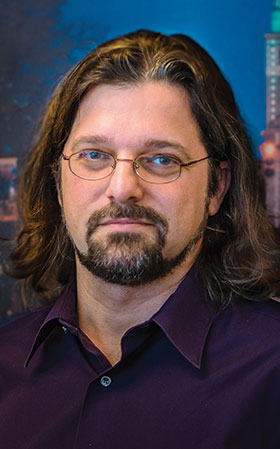Advice for a Successful Summer: #HowtoREU
Spring
2022
Letter
Advice for a Successful Summer: #HowtoREU
Kiril A. Streletzky, President, Society of Physics Students
 It's the time of year when many physics and astronomy students are looking forward to finishing the semester and beginning a summer research experience or a summer research internship. If that’s you, congratulations! As an REU Site program director at Cleveland State University and an undergraduate research advisor, I’d like to share some advice for making the most of your experiences, this summer and beyond. If the idea of a summer research experience is new to you, keep reading anyway—hopefully you’ll be inspired to try one next summer.
It's the time of year when many physics and astronomy students are looking forward to finishing the semester and beginning a summer research experience or a summer research internship. If that’s you, congratulations! As an REU Site program director at Cleveland State University and an undergraduate research advisor, I’d like to share some advice for making the most of your experiences, this summer and beyond. If the idea of a summer research experience is new to you, keep reading anyway—hopefully you’ll be inspired to try one next summer.
Summer research opportunities are unique and rewarding experiences. They can be critical for helping you figure out what you want to do in the future. A summer research experience can help you determine if a research-based graduate program or job is a good fit for you. REUs and other summer research opportunities are a great chance to try research while being paid and without any real danger of failing, a chance to discover whether research in general, and the specific type of research you’re doing, excites you. It’s fine if it isn’t a good fit. The point is that you can figure this out now during the summer as opposed to after starting graduate school. It’s a great way to test drive a career with a research component.
Research experiences are also vital opportunities to create a network of friends and colleagues, connect to your peers in the program, and build a network of research mentors―graduate students, faculty, research scientists, and postdocs. These networks can be extremely important for your future career. Peer networks can offer support and help with navigating scholarship applications, graduate school, and beyond. And when you’re applying for jobs or grad school, your summer research mentors can be your strongest references and recommenders.
To make the most of your summer, start preparing now. If you are heading to an internship or REU, you probably have a project description. If not, reach out to the program director or your research advisor and find out what you’ll be working on and how you can prepare. Then dive into the topic by working with corresponding literature suggestions. Research advisors appreciate new students coming into the lab with specific questions about the project, since it shows that they’ve already thought about what they’ll be working on. Knowing the basics will also help you be more productive in the lab and benefit more from your 10-week-long summer research experience.
Once you’re in your summer program, really treasure the experience and get as much as you can out of it. Have fun and learn new skills. Never be afraid to ask questions. Spend time reflecting on how well this research suits you, and start building your network. Don’t hesitate to reach out for help if you encounter any problems. If your mentor is unable to give you the attention you need, talk to other members of your lab and/or program administrators and directors. They are invested in your success and can help facilitate the best possible experience for you.
Securing an REU or an internship is a significant achievement already. You should be proud of yourself. Expect to have the time of your life, learn a ton, and have a great summer!
What’s an REU?
The National Science Foundation (NSF) funds research opportunities for undergraduate students in various disciplines through its REU Sites program. REU stands for research experiences for undergraduates. An REU Site consists of a group of 10 or so undergraduates who work in the research programs of the host institution. Each student has a specific research project and works closely with faculty and other researchers. Students receive stipends and, in many cases, assistance with housing and travel. REUs are commonly 10-week summer programs. Not all summer research opportunities in astronomy and physics are REUs, but many of those that aren’t have a similar program model.
To learn more and search REU Sites, visit nsf.gov/crssprgm/reu/.
#HowToREU
To learn more about REUs, summer experiences, and how you can set yourself up for success this summer, watch #HowToREU with Brad Conrad and Kiril Streletzky on YouTube. While you’re there, be sure to check out the other awesome videos from SPS National!
SPS Jobs has listings for the latest internships, research experiences for undergraduates (REUs), and summer research jobs in physics and the physical science and engineering fields, plus jobs in specialized disciplines like applied physics, biophysics, materials, astronomy and space science, computational physics, condensed matter physics, astrophysics, mathematics, and more! Find a job as a precareer or entry-level scientist or engineer at jobs.spsnational.org.
